A Blog about the Life and Times of William Pitt the Younger (and George IV)
Don't wanna be here? Send us removal request.
Text
Imagine your favorite historical figure as a ghost next to a statue of themselves and complaining about it
#reblog#joachimnapoleon#napoleon bonaparte#arthur wellesley#19th century#duke of wellington#british history#french history#antonio canova#history humour
565 notes
·
View notes
Text
Brummell and the Duchess of York

I started reading Death on a Silver Tray by Rosemary Stevens. The story takes place in Georgian England and apparently is some sort of Sherlock Holmes style mystery novel with Beau Brummell as Sherlock Holmes. His partner during his investigations – you will never guess it – Friederike Duchess of York and Albany.
I fear, based on the set-up alone, that this is going to be a very bad book, but who knows, maybe the book surprises me …
#beau brummell#friederike duchess of york and albany#books#british history#rosemary stevens#death on a silver tray
0 notes
Photo
That is the best thing I have seen in a long time!








George III And His Sons Personals, excuse me wile I hit my head against the wall for making such a dumb thing.
This morning when I discovered that Twitter account due to this post I was like “Good Lord, they are sooo Prinny & Co if they were on craigslist”.
104 notes
·
View notes
Text
King George III to his sister on the Death of their Mother
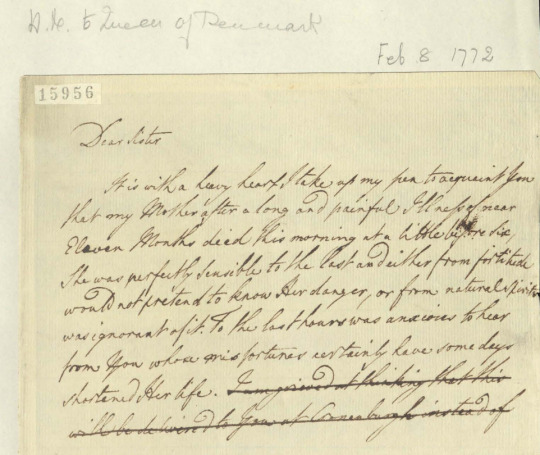
Dear Sister It is with a heavy heart I take up my pen to acquaint You that my Mother after a long and painful illness near Eleven Months died this morning at a little before Six, She was perfectly Sensible to the last and either from fortitude would not pretend to know Her danger, or from natural spirits was ignorant of it. To the last hour [she] was anxious to hear from You whose misfortune certainly have some days shortened Her life. I am grieved at thinking that this letter will be delivered to You at Cronenburgh [Kronborg] instead of
King George III informs his exiled sister Caroline Matilde, Queen of Denmark and Norway of the death of their mother, February 8, 1772. GEO/MAIN/15956.
#handwriting#the georgian papers programm#king george iii#british history#queen charoline matilde of denmark and norway#augusta dowager princess of wales#18th century#1772#completley beside the point but Kronborg is a lovely place
2 notes
·
View notes
Text
The Growth of the Royal Children from 1772 to 1773
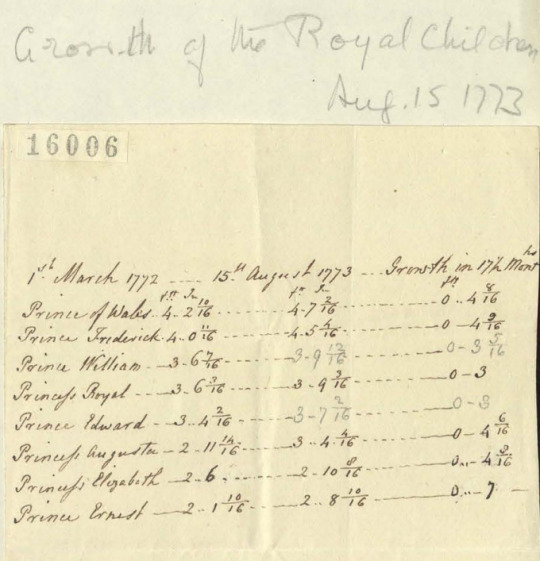
Memorandum concerning the growth of Royal Children, dated August 15, 1773. GEO/MAIN/16006.
#british history#george iv#prince frederick duke of york and albany#prince william henry duke of clarence#princess charlotte matilda princess royal#prince edward duke of kend and strathearn#princess augusta sophia#princess elizabeth#prince ernest augustus duke of cumberland#george iii#queen charlotte#1772#1773#handwriting#the georgian papers programm#18th century
8 notes
·
View notes
Text
The Godparents of some of the Children of King George III and Queen Charlotte

The Prince of Wales was named George Augustus Frederick Godfathers Duke of Cumberland, and Duke of Mecklenburg-Strelitz Godmother Princess Dowager of Wales. Prince Frederick Godfathers Duke of York, and Duke of Saxe Gotha. Godmother Princess Amelia. Prince William Henry Godfathers Duke of Gloucester and Duke of Cumberland. Godmother Hereditary Princess of Brunswick Princess Royal named Charlotte Matilda Godfather King of Denmark Godmother Queen of Denmark and Princess Louisa. Prince Edward Godfather Hereditary Prince of Brunswick and Prince Charles of Mecklenburg Strelitz. Godmother Landgravine of Hesse Cassel (?) Princess Augusta Godfather Prince of Orange Godmothers Duchess of Sace Weissenfels Princess Christiana of Mecklenburg Strelitz Princess Elizabteh Godfather Hereditary Prince of Hesse Cassel Godmothers Princess Royal of Sweden, Princess of Nassau Walburg
Memorandum relating to godparents of the royal children, dated 1770. GEO/MAIN/15897-15897A.
#british history#george iv#prince frederick duke of york#prince william duke of clarence#princess charlotte princess royal#prince edward duke of kent and strathearn#princess augusta sophia#princess elizabeth#king george iii#1770#queen charlotte#handwriting#the georgian papers programm#18th century
6 notes
·
View notes
Text
youtube
youtube
youtube
youtube
I admit that I had not had the time to watch any of these episodes yet - but Arte does very solid work most of the time and I am hopeful here (there should also be French versions on YouTube).
#george i#george ii#george iii#george iv#arte#youtube#german#british history#european history#regency#Youtube
10 notes
·
View notes
Text
Historian Alice Loxton explaining this political satire of Napoleon and William Pitt the Younger, 1805, by James Gillray. Displayed at the London Original Print Fair.
She calls it “one of the most famous political cartoons ever made.”
#reblog#empirearchives#art#caricatures#youtube#william pitt#william pitt the younger#british history#1805#james gillray#alice loxton is great!
173 notes
·
View notes
Text
That is such a wild one ... 😅
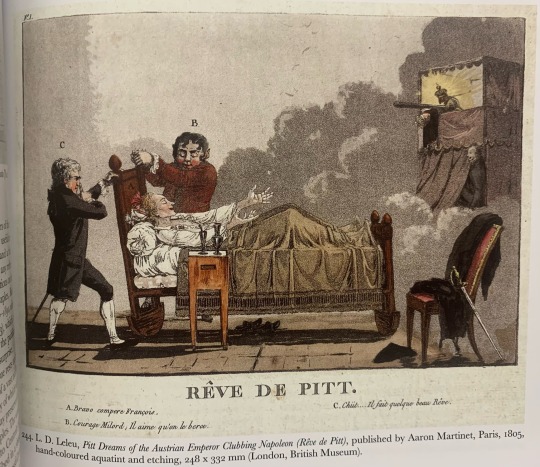



Napoleonic caricatures from 1805
#reblog#empirearchives#william pitt the younger#william pitt#british history#french history#caricature#1805#napoleon
32 notes
·
View notes
Text

491 notes
·
View notes
Text
I am very glad to see you write without the assistance of a secretary. Perhaps however, you will not be able to read without the assistance of a decypherer. At least in compassion to your poor eyesight it is as well for me to try it no further.
William Pitt to William Wilberforce, July 31, 1782
A. M. Wilberforce, editor, Private Papers of William Wilberforce, T. Fisher Unwin, London, 1897, pp. 3-4.
having friends who are also historians is important because you need to get together and drag dead people's terrible, terrible handwriting
#william pitt the younger#william pitt#british history#reblog#my-deer-friend#handwriting#it is always a joke#1782#letter#william wilberforce
172 notes
·
View notes
Text
As report might possibly carry to Burton an exaggerated account of my having been unwell (...)
There is one aspect of Pitt’s correspondence that I find incredibly endearing. Whenever he had been ill – and, starting maybe in early to mid-thirties, he was quite often ill. Some of these illnesses were trifles that passed quickly but sometimes he was seriously ill. The newspaper often reported about his health – he was Prime Minister after all and not also was his persona of public interest, his absence was also noted. Whenever he was recovered enough to write letters, his first order of business usually was to write to his mother and these letters were always along the lines of “I do not know what you heared about my health – BUT whatever it was, it was vastly exaggerated. I am fine, I am fine. I have always been fine. Nothing to worry about.”

#william pitt#william pitt the younger#countess of chatham#history#british history#letters#pitt's health
6 notes
·
View notes
Text
Thank you for the tag - and always feel free to do so. :-)
I actually did knew about this because Austen's actions here are legendary.
I kind of love that one of Jane Austen's biggest fans was the Prince Regent (later George IV). She didn't think very well of the nobility in general, but she motherfucking hated him, a wastrel who very flagrantly cheated on his wife.
But he loved her writing, was the first recorded purchaser of Sense and Sensibility, and kept copies of her books in all his residences. She never made enough from her writing to live on during her lifetime, so this wasn't support she could casually toss aside. His librarian kept suggesting ideas for new books to her, which she turned down with exquisite politeness. Much to her aggravation, she found herself obliged to dedicate Emma to the man.
Local Novelist Is So Talented She Can't Beat Royal Patron Off With A Stick
51K notes
·
View notes
Text
William Pitt’s "Records"
Pitt was the youngest Prime Minister to ever assume office (and he likely will be able to keep this distinction.) He was 24 years and 205 days old when he assumed office. The next oldest Prime Minister was Augustus FitzRoy, 3rd Duke of Grafton who was 33 years and 16 days old when he assumed office.
He was also the second longest serving Prime Minister with a total tenure of 18 years and 345 days before he died in office. Only Robert Walpole, Britain’s first Prime Minister served longer - with a tenure of 20 years and 315 days.
Pitt was however the longest inhabitant of Downing Street Number 10. While he spend pretty much all of his Premiership in Number 10 (there was some delay with moving in), Walpole only moved in during September of 1735 (his term ended on February 11, 1742). George II had offered Downing Street 10 as a private gift to Walpole in 1732 but he refused to accept unless Downing Street would become an official residence for office holders.
Speaking of dying in office, Pitt was one of seven Prime Ministers to die in office. (Which, might I add, means that 12.5% of all Prime Ministers (56, the current one not included) died in office. That is an eight of all office holders – and there is also a number of Ministers who died within weeks of leaving office.)
From these seven, he was the youngest to die in office for Pitt died aged 46 years and 240 days. Out of all Prime Ministers, there was only one who died younger. William Cavendish, 4th Duke of Devonshire, died aged 44 years and 147 days.
Pitt also was one of 17 men who had two or more terms as Prime Ministers. The record holder here is William Ewart Gladstone with four terms.
Pitt also has the dubious distinction of being the first Prime Minister to fight a duel while in office. The Duke of Wellington would later be the second and last Prime Minister to do so.
Pitt was one of only four Prime Ministers who never married.
While many, many Prime Minister had some type of kinship with each other, either by blood or by marriage, Pitt had some of the more direct relations to other Prime Ministers. He and his father, William Pitt the Elder (very conveniently named) were one of only two father-son-couples. The Young Pitt and Lord William Grenville were furthermore the only full cousins. Pitt and George Grenville were also one of two uncle-nephew-couples who filled the office of Prime Minister.
Last but not least, enjoy this lovely sentence from Wikipedia. The modern equivalent of over three Million … let that sink in.

#william pitt the younger#william pitt#british history#history#prime ministers#24 is so insanly young#and 3 million is so much money ...
10 notes
·
View notes
Photo
No, that is a wonderful summary and I have nothing more to add. Or maybe one thing; it is not at all impossible that Pitt himself owned a copy of the print. He was known to collect some of Gillray's prints, both works that featured and did not feature him.
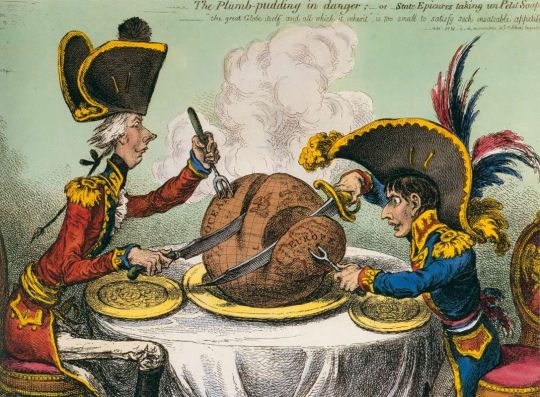
#reblog#acrossthewavesoftime#william pitt#william pitt the younger#history#james gillray#napoleon#napoleón bonaparte#1805#art
133 notes
·
View notes
Text
She mourns (...) her faithful Pitt
This very ... patriotic, poem was published by The Gentleman’s Magazine in early 1806. It was written by the anonyms “B” to commemorate all the changes the end of 1805 and the begin of 1806 brought to the nation. While I find some of the stanzas a bit … questionable, some passengers sound rather nice.

The New-Born Year Eventful entrance of the new-born Year! Britannia mourns her bravest Hero Slain, Her NELSON coffin’d on the trophied bier, And borne in triumph to the sacred Fane. She mourns her ablest Statesman snatch’d away, Her faithful PITT, illustrious Chatham’s Son; Pitt, who asserted George’s royal sway, And of true Freedom’s truest friends was one. She mourns CORNWALLIS, India’s friend sincere, Who twice the Ocean cross’d that land to save; But, oh! Too far advanc’d in life’s career. He cross’d the Ocean for an Indian grave. Ill-omen’d entrance of the new-born Year! So pale desponding Senex faintly cries- Ill-omen’d? – Blot away that word of fear: For the bright gleams succeed to low’ring skies. Now gallant COLLINGWOOD protects our coast- He and his comrads train’ in NELSON’s school, Have learn’d this maxim each true Briton boasts That God for Britain the proud waves doth rule. Look ye for guardians of domestic life? Behold the Church, the Senate, and Bar- May these dispel our cares and curb our strife, And guide us through right paths whene’er we err! Bless’d be the counsel, whencefoer’er it springs, Whose zeal, combin’d with judgment, warmly glows, Which smooths the pillow of the best of Kings, And guards fair Britain from insulting foes. B.
The Gentleman's Magazine, 1806, 2:76, p. 255.
#horatio nelson#william pitt#william pitt the younger#charles cornwallis#cuthbert collingwood#1805#1806#british history#history#the gentelman's magazine
12 notes
·
View notes
Text
The House of Commons reacting to Pitt’s Death
Pitt died on January 23, 1806 and the House of Commons meet the next day. The death of the Prime Minister had spread like wildfire – especially since his health had been so bad for so long, so there was no need for a public declaration. It was assumed everybody present was aware of the circumstances. In fact, the first order of business was a letter from the King read to the Members of Parliaments (the King thanked them for expressing their condolence upon the death of his brother, the Duke of Gloucester) and the continuous affair of the impeachment of Henry Dundas, Lord Melville. Pitt’s death was the third order of business that day. It was proposed that the House should debate his funeral and a show of public respect on Monday next, January 27.
His death was of a political and social consequence. Pitt’s passing left many important positions vacant, not just the office of Prime Minister. He had a considerable group of friends and followers in Parliament. Many of his colleagues, even if they were in opposition to his political points, expressed sympathy, respect for him.
There was also a certain order of business that was expected when a person of such public interest and a Prime Minister no less, died.
The topic of his death and funeral was again brought up on January 27, when a replacement for Pitt’s seat in Parliament was also sought. The House also took the time to reflect upon Pitt’s character and political legacy at length. Mr. Lascelles rose to present the motion:
I shall therefore conclude with moving, “That an humble address be presented to his majesty, that his majesty will be graciously pleased to give directions, that the remains of the right hon. William Pitt be interred at the public charge; and that a monument be erected, in the collegiate church of St. Peter, Westminster, to the memory of that excellent statesman, with an inscription expressive of the public sense of so great and irreparable a loss; and to assure his majesty that this house will make good the expences attending the same.”
Corbbett’s Parliamentary Debates, Vol. XI, London, p. 73.
The vote went as follows:
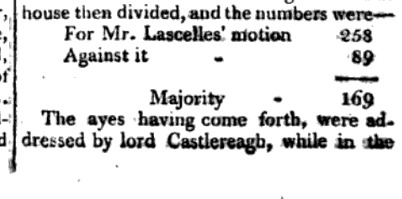
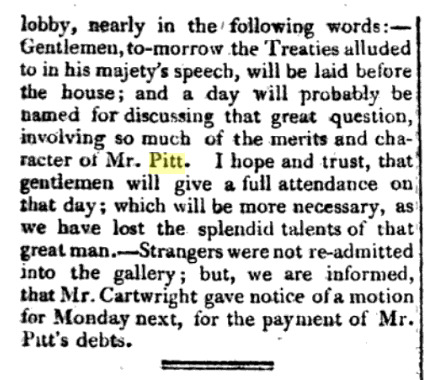
Corbbett’s Parliamentary Debates, Vol. XI, London, pp. 73-74.
Mentioned in the last instant is the debate over the full payment of Pitt’s debts (messy affair and messy debate) that would be discussed Monday next, February 3, 1806. On that day, the House was much more divided upon the topic of Pitt’s debts, but one very interesting speech came from nonother than Charles James Fox:
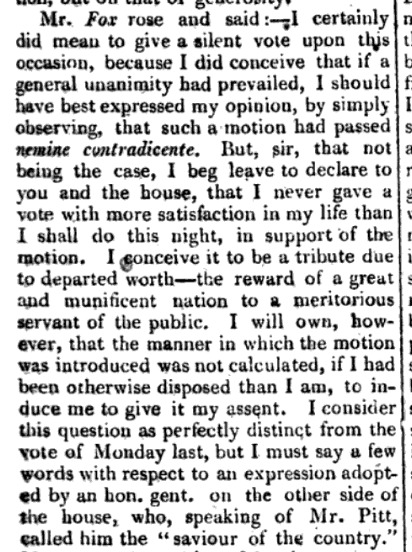
I shortened his speech a bit, but Fox essentially goes on to criticize some of the arguments and tactics made by the other proponents of the notion – while still being in support himself.
Corbbett’s Parliamentary Debates, Vol. XI, London, pp. 127-140.
#british history#history#william pitt the younger#william pitt#1806#charles james fox#politics#corbbett's parliamentary debates#henry lascelles#lord castlereagh
10 notes
·
View notes